考研英语攻略:段落排序题题型解析
考研英语大纲解析之新题型——排序题全攻
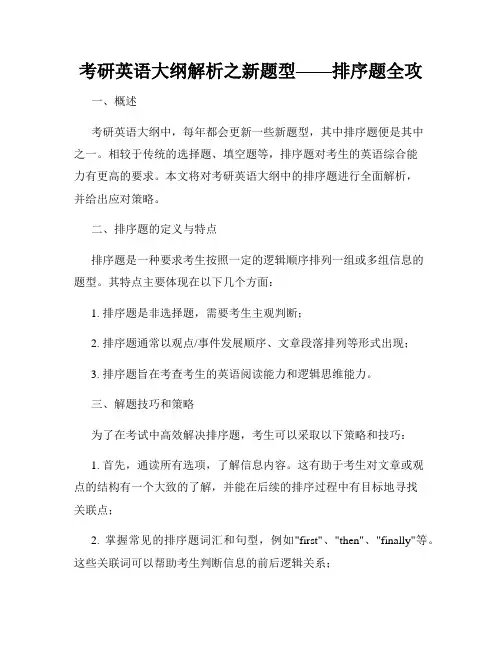
考研英语大纲解析之新题型——排序题全攻一、概述考研英语大纲中,每年都会更新一些新题型,其中排序题便是其中之一。
相较于传统的选择题、填空题等,排序题对考生的英语综合能力有更高的要求。
本文将对考研英语大纲中的排序题进行全面解析,并给出应对策略。
二、排序题的定义与特点排序题是一种要求考生按照一定的逻辑顺序排列一组或多组信息的题型。
其特点主要体现在以下几个方面:1. 排序题是非选择题,需要考生主观判断;2. 排序题通常以观点/事件发展顺序、文章段落排列等形式出现;3. 排序题旨在考查考生的英语阅读能力和逻辑思维能力。
三、解题技巧和策略为了在考试中高效解决排序题,考生可以采取以下策略和技巧:1. 首先,通读所有选项,了解信息内容。
这有助于考生对文章或观点的结构有一个大致的了解,并能在后续的排序过程中有目标地寻找关联点;2. 掌握常见的排序题词汇和句型,例如"first"、"then"、"finally"等。
这些关联词可以帮助考生判断信息的前后逻辑关系;3. 注意段落间的过渡和信息的呼应。
有时候可以通过判断某个观点在其他句子中是否有相关提及,来确定其在顺序中的位置;4. 利用排除法。
在考试中,如果对某个选项非常有把握其错误,可以优先排除该选项,以减少解题范围;5. 注意选项的具体表达方式。
选项中可能使用了近近义词替换、改变了句子结构等手法,因此考生需要细心辨别选项之间的差异。
四、练习与提高方法为了更好地应对排序题,考生可以进行以下练习与提高方法:1. 阅读大量排序题例题和解析。
通过阅读更多的排序题例题,考生可以熟悉这种题型的特点和解题技巧,并能更好地应用于实际考试中;2. 制定解题策略并进行实操练习。
考生可以根据自己的解题习惯和策略,进行系统性的实操练习,以掌握更高效解题的能力;3. 模拟真实考试场景进行训练。
考生可以在规定的时间内完成一套完整的考试题目,以提高在压力下解题的能力;4. 寻求教师或老师的指导。
考研英语段落排序题.docx
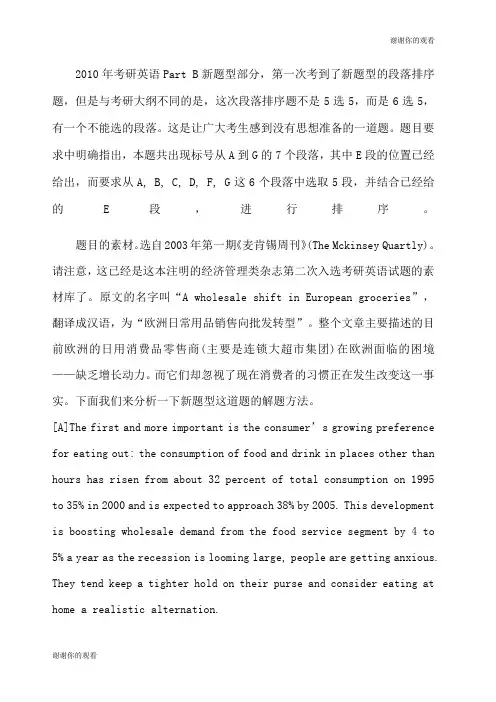
2010年考研英语Part B新题型部分,第一次考到了新题型的段落排序题,但是与考研大纲不同的是,这次段落排序题不是5选5,而是6选5,有一个不能选的段落。
这是让广大考生感到没有思想准备的一道题。
题目要求中明确指出,本题共出现标号从A到G的7个段落,其中E段的位置已经给出,而要求从A, B, C, D, F, G这6个段落中选取5段,并结合已经给的E段,进行排序。
题目的素材。
选自2003年第一期《麦肯锡周刊》(The Mckinsey Quartly)。
请注意,这已经是这本注明的经济管理类杂志第二次入选考研英语试题的素材库了。
原文的名字叫“A wholesale shift in European groceries”,翻译成汉语,为“欧洲日常用品销售向批发转型”。
整个文章主要描述的目前欧洲的日用消费品零售商(主要是连锁大超市集团)在欧洲面临的困境——缺乏增长动力。
而它们却忽视了现在消费者的习惯正在发生改变这一事实。
下面我们来分析一下新题型这道题的解题方法。
[A]The first and more important is the consumer’s growing preference for eating out: the consumption of food and drink in places other than hours has risen from about 32 percent of total consumption on 1995 to 35% in 2000 and is expected to approach 38% by 2005. This development is boosting wholesale demand from the food service segment by 4 to 5% a year as the recession is looming large, people are getting anxious. They tend keep a tighter hold on their purse and consider eating at home a realistic alternation.[B] Retail, sales of food and drink in Europe’s largest markets are at a standstill, leaving European grocery retailers hungry for opportunities to grow. Most leading retails have already tried e-commerce, with limited success, and expansion aboard. But almost all have ignored the big profitable opportunity in their own back yard: the wholesale food and drink trade, which appears to be just the kind of market retailers need.[C] Will such variations bring about a change in overall structure of the food and drink market? Definitely not. The functioning of the market is base on flexible trends dominated by potential buyers. In other words, it is up to the buyer, rather than the seller, to decide. What to buy. At any rate, this change and international consumers, regardless of how long the current consumer pattern will take hold.[D] All in all, this clearly seems to be a market in which big retailers could profitably apply their gigantic scale, existing infrastructure, and proven skills in the management of product ranges, logistics, and marketing intelligence. Retailers that master the intricacies of wholesaling in Europe may well expect to rank in substantial profits thereby. At last, that is how it looks as a whole. Closer inspection reveals important differences among the biggest nation market especially in their customer segment and wholesale structures, a as well as the competitive dynamics.[E] Despite variations in detail, wholesale markets in the countries that have been closely examined---France, Germany—are made out of the same building block. Demand mainly from two sources: in dependent mom—and –pop grocery stores which, unlike large retail chains, are too small to buy straight when they don’t eat at home. Such food service operators, but most of these businesses are known in the trade as “horeca”:hotels, restaurant and cafes. Overall, Europe’s wholesale market for food and drink is growing at the same sluggish pace as the retail market, but the figure when assed together, mask too opposing trends.[F] For example, wholesale food and drink sales came to $268 billion in France, Germany, Spain, America in 2000 --- more than 40 percent of retail sales. Moreover, average overall margins are higher in wholesale than in retail ; wholesale demand from the food service sector is growing quickly as more Europeans eat out more often ;and in the competitive dynamics of this fragmented industry are at last man it feasible for wholesalers to consolidate.[G] However, none of these requirements should deter large retailers land even some large food producers and existing wholesalers, from trying their hand, foe those that master the intricacies of wholesaling in Europe stand to reap considerable gains.解题步骤与思路:一.归纳6个选项的段落大意,同时注意两个选项之间的联系。
考研英语一段落排序技巧
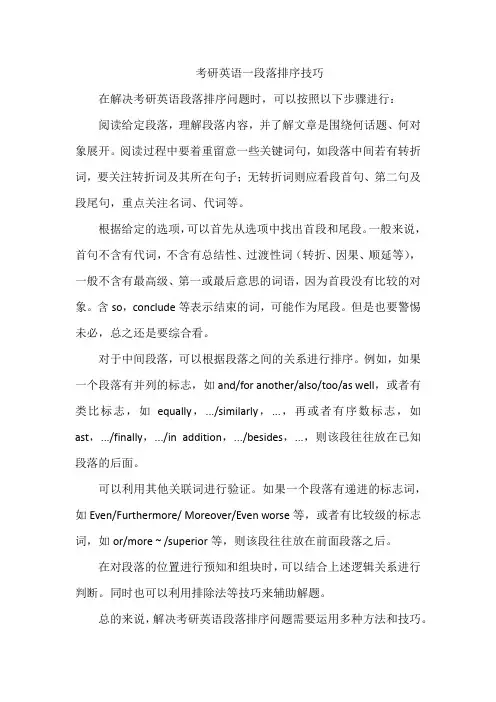
考研英语一段落排序技巧在解决考研英语段落排序问题时,可以按照以下步骤进行:阅读给定段落,理解段落内容,并了解文章是围绕何话题、何对象展开。
阅读过程中要着重留意一些关键词句,如段落中间若有转折词,要关注转折词及其所在句子;无转折词则应看段首句、第二句及段尾句,重点关注名词、代词等。
根据给定的选项,可以首先从选项中找出首段和尾段。
一般来说,首句不含有代词,不含有总结性、过渡性词(转折、因果、顺延等),一般不含有最高级、第一或最后意思的词语,因为首段没有比较的对象。
含so,conclude等表示结束的词,可能作为尾段。
但是也要警惕未必,总之还是要综合看。
对于中间段落,可以根据段落之间的关系进行排序。
例如,如果一个段落有并列的标志,如and/for another/also/too/as well,或者有类比标志,如equally,.../similarly,...,再或者有序数标志,如ast,.../finally,.../in addition,.../besides,...,则该段往往放在已知段落的后面。
可以利用其他关联词进行验证。
如果一个段落有递进的标志词,如Even/Furthermore/ Moreover/Even worse等,或者有比较级的标志词,如or/more ~ /superior等,则该段往往放在前面段落之后。
在对段落的位置进行预知和组块时,可以结合上述逻辑关系进行判断。
同时也可以利用排除法等技巧来辅助解题。
总的来说,解决考研英语段落排序问题需要运用多种方法和技巧。
除了上述提到的阅读理解、选项分析、逻辑关系和排除法等技巧外,还可以结合其他解题技巧来提高解题效率和准确性。
同时也要注意时间管理,合理分配时间进行答题。
以下是一个考研英语段落排序的例子:将以下段落重新排列,使其成为一个完整的文章:(1)On the other hand, there are also many benefits to having a reliable group of friends.(2)In conclusion, while both types of communication have their advantages and disadvantages, emailing is generally more convenient and efficient for business use.(3)Emailing is also less personal and less immediate than a face-to-face conversation.(4)Therefore, it is important to consider the type of communication that will be most effective in achieving the desired outcome.(5)For example, if the purpose of the communication is to establish a personal relationship, then face-to-face communication may be more appropriate.(6)However, if the purpose of the communication is to share information or to make a business transaction, then emailing may be a better choice.排序逻辑解析:文章讨论了两种不同的沟通方式:面对面的对话和电子邮件。
【考研必读】2019考研英语新题型:段落排序题解题技巧
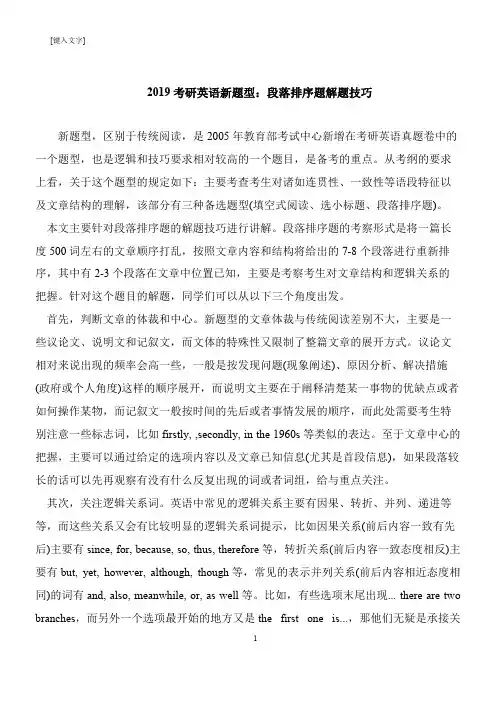
[键入文字]2019考研英语新题型:段落排序题解题技巧新题型,区别于传统阅读,是2005年教育部考试中心新增在考研英语真题卷中的一个题型,也是逻辑和技巧要求相对较高的一个题目,是备考的重点。
从考纲的要求上看,关于这个题型的规定如下:主要考查考生对诸如连贯性、一致性等语段特征以及文章结构的理解,该部分有三种备选题型(填空式阅读、选小标题、段落排序题)。
本文主要针对段落排序题的解题技巧进行讲解。
段落排序题的考察形式是将一篇长度500词左右的文章顺序打乱,按照文章内容和结构将给出的7-8个段落进行重新排序,其中有2-3个段落在文章中位置已知,主要是考察考生对文章结构和逻辑关系的把握。
针对这个题目的解题,同学们可以从以下三个角度出发。
首先,判断文章的体裁和中心。
新题型的文章体裁与传统阅读差别不大,主要是一些议论文、说明文和记叙文,而文体的特殊性又限制了整篇文章的展开方式。
议论文相对来说出现的频率会高一些,一般是按发现问题(现象阐述)、原因分析、解决措施(政府或个人角度)这样的顺序展开,而说明文主要在于阐释清楚某一事物的优缺点或者如何操作某物,而记叙文一般按时间的先后或者事情发展的顺序,而此处需要考生特别注意一些标志词,比如firstly, ,secondly, in the 1960s等类似的表达。
至于文章中心的把握,主要可以通过给定的选项内容以及文章已知信息(尤其是首段信息),如果段落较长的话可以先再观察有没有什么反复出现的词或者词组,给与重点关注。
其次,关注逻辑关系词。
英语中常见的逻辑关系主要有因果、转折、并列、递进等等,而这些关系又会有比较明显的逻辑关系词提示,比如因果关系(前后内容一致有先后)主要有since, for, because, so, thus, therefore等,转折关系(前后内容一致态度相反)主要有but, yet, however, although, though等,常见的表示并列关系(前后内容相近态度相同)的词有and, also, meanwhile, or, as well等。
新考研英语段落排序题题型解析9
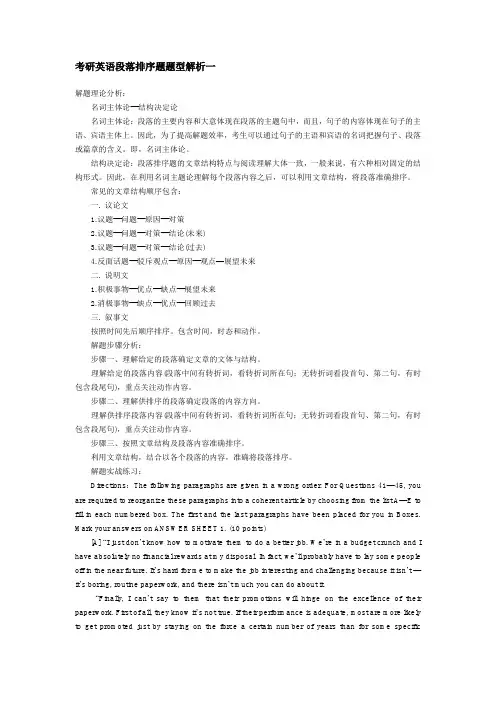
考研英语段落排序题题型解析一解题理论分析:名词主体论---结构决定论名词主体论:段落的主要内容和大意体现在段落的主题句中,而且,句子的内容体现在句子的主语、宾语主体上。
因此,为了提高解题效率,考生可以通过句子的主语和宾语的名词把握句子、段落或篇章的含义。
即,名词主体论。
结构决定论:段落排序题的文章结构特点与阅读理解大体一致,一般来说,有六种相对固定的结构形式。
因此,在利用名词主题论理解每个段落内容之后,可以利用文章结构,将段落准确排序。
常见的文章结构顺序包含:一. 议论文1.议题---问题---原因---对策2.议题---问题---对策---结论(未来)3.议题---问题---对策---结论(过去)4.反面话题---驳斥观点---原因---观点—展望未来二. 说明文1.积极事物---优点---缺点---展望未来2.消极事物---缺点---优点---回顾过去三. 叙事文按照时间先后顺序排序。
包含时间,时态和动作。
解题步骤分析:步骤一、理解给定的段落确定文章的文体与结构。
理解给定的段落内容(段落中间有转折词,看转折词所在句;无转折词看段首句、第二句,有时包含段尾句),重点关注动作内容。
步骤二、理解供排序的段落确定段落的内容方向。
理解供排序段落内容(段落中间有转折词,看转折词所在句;无转折词看段首句、第二句,有时包含段尾句),重点关注动作内容。
步骤三、按照文章结构及段落内容准确排序。
利用文章结构,结合以各个段落的内容,准确将段落排序。
解题实战练习:Directions:The following paragraphs are given in a wrong order. For Questions 41—45, you are required to reorganize these paragraphs into a coherent article by choosing from the list A—E to fill in each numbered box. The first and the last paragraphs have been placed for you in Boxes. Mark your answers on ANSWER SHEET 1. (10 points)[A] “I just don’t know how to motivate them to do a better job. We’re in a budget crunch and I have absolutely no financial rewards at my disposal. In fact, we’ll probably have to lay some people off in the near future. It’s hard for me to make the job interesting and challenging because it isn’t —it’s boring, routine paperwork, and there isn’t much you can do about it.“Finally, I can’t say to them that their promotions will hinge on the excellence of their paperwork. First of all, they know it’s not true. If their performance is adequate, most are more likely to get promoted just by staying on the force a certain number of years than for some specificoutstanding act. Second, they were trained to do the job they do out in the streets, not to fill out forms. All through their career it is the arrests and interventions that get noticed.[C] “I’ve got a real problem with my officers. They come on the force as young, inexperienced men, and we send them out on the street, either in cars or on a beat. They seem to like the contact they have with the public, the action involved in crime prevention, and the apprehension of criminals. They also like helping people out at fires, accidents, and other emergencies.[D] “Some people have suggested a number of things like using conviction records as a performance criterion. However, we know that’s not fair — too many other things are involved. Bad paperwork increases the chance that you lose in court, but good paperwork doesn’t necessarily mean you’ll win. We tried setting up team competitions based on the excellence of the reports, but the guys caught on to that pretty quickly. No one was getting any type of reward for winning the competition, and they figured why should they labor when there was no payoff.[E] “The problem occurs when they get back to the station. They hate to do the paperwork, and because they dislike it, the job is frequently put off or done inadequately. This lack of attention hurts us later on when we get to court. We need clear, factual reports. They must be highly detailed and unambiguous. As soon as one part of a report is shown to be inadequate or incorrect, the rest of the report is suspect. Poor reporting probably causes us to lose more cases than any other factor.[F] “So I just don’t know what to do. I’ve been groping in the dark in a number of years. And I hope that this seminar will shed some light on this problem of mine and help me out in my future work.”[G] A large metropolitan city government was putting on a number of seminars for administrators, managers and/or executives of various departments throughout the city. At one of these sessions the topic to be discussed was motivation -- how we can get public servants motivated to do a good job. The difficulty of a police captain became the central focus of the discussion.Order:G--41--42--43--44--45--F步骤一、理解给定的段落确定文章的文体与结构。
2020考研英语新题型之排序题得分之道
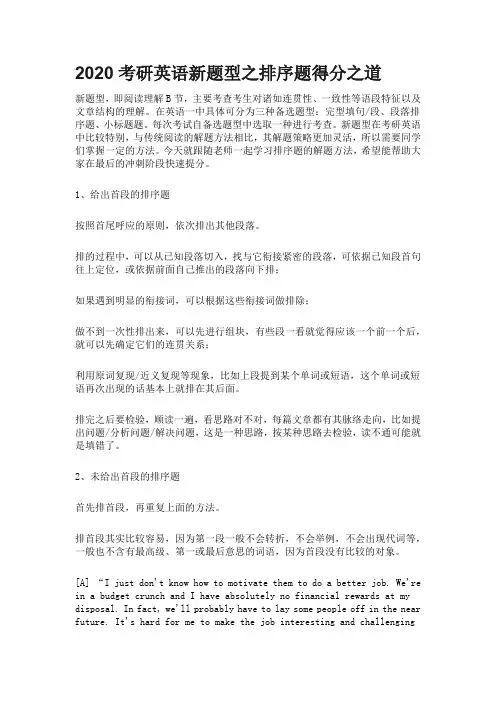
2020考研英语新题型之排序题得分之道新题型,即阅读理解B节,主要考查考生对诸如连贯性、一致性等语段特征以及文章结构的理解。
在英语一中具体可分为三种备选题型:完型填句/段、段落排序题、小标题题。
每次考试自备选题型中选取一种进行考查。
新题型在考研英语中比较特别,与传统阅读的解题方法相比,其解题策略更加灵活,所以需要同学们掌握一定的方法。
今天就跟随老师一起学习排序题的解题方法,希望能帮助大家在最后的冲刺阶段快速提分。
1、给出首段的排序题按照首尾呼应的原则,依次排出其他段落。
排的过程中,可以从已知段落切入,找与它衔接紧密的段落,可依据已知段首句往上定位,或依据前面自己推出的段落向下排;如果遇到明显的衔接词,可以根据这些衔接词做排除;做不到一次性排出来,可以先进行组块,有些段一看就觉得应该一个前一个后,就可以先确定它们的连贯关系;利用原词复现/近义复现等现象,比如上段提到某个单词或短语,这个单词或短语再次出现的话基本上就排在其后面。
排完之后要检验,顺读一遍,看思路对不对,每篇文章都有其脉络走向,比如提出问题/分析问题/解决问题,这是一种思路,按某种思路去检验,读不通可能就是填错了。
2、未给出首段的排序题首先排首段,再重复上面的方法。
排首段其实比较容易,因为第一段一般不会转折,不会举例,不会出现代词等,一般也不含有最高级、第一或最后意思的词语,因为首段没有比较的对象。
[A] “I just don't know how to motivate them to do a better job. We're in a budget crunch and I have absolutely no financial rewards at my disposal. In fact, we'll probably have to lay some people off in the near future. It's hard for me to make the job interesting and challengingbecause it isn't—it's boring, routine paperwork, and there isn't much you can do about it.”[B] “Finally, I can't say to them th at their promotions will hinge on the excellence of their paperwork. First of all, they knew it's not true. If their performance is adequate, most are more likely to get promoted just by staying on the force a certain number of years than for some specific outstanding act. Second, they were trained to do the job they do out in the streets, not to fill out forms. All through their career it is the arrests and interventions that get noticed.”[C] “I've got a real problem with my officers. They come on the for ce as young, inexperienced men, and we send them out on the street, either in cars or on a beat. They seem to like the contact they have with the public, the action involved in crime prevention, and the apprehension of criminals. They also like helping people out at fires, accidents, and other emergencies.”[D] “Some people have suggested a number of things like using conviction records as a performance criterion. However, we know that's not fair—too many other things are involved. Bad paperwork increases the chance that you lose in court, but good paperwork doesn't necessarily mean you'll win. We tried setting up team competitions based on the excellence of the reports, but the guys caught on to that pretty quickly. No one was getting any type of reward for winning the competition, and they figured why should they labor when there was no payoff.”[E] “The problem occurs when they get back to the station. They hate to do the paperwork, and because they dislike it, the job is frequently put off or done inadequately. This lack of attention hurts us later on when we get to court. We need clear, factual reports. They must be highly detailed and unambiguous. As soon as one part of a report is shown to be inadequate or incorrect, the rest of the report is suspect. Poor reporting probably causes us to lose more cases than any other factor.”[F] “So I just don't know what to do. I've been groping in the dark in a number of years. And I hope that this seminar will shed some light on this problem of mine and help me out in my future work.”[G] A large metropolitan city government was putting on a number of seminars for administrators, managers and/or executives of various departments throughout the city. At one of these sessions the topic tobe discussed was motivation—how we can get public servants motivated to do a good job. The difficulty of a police captain became the central focus of the discussion.Order:G→ 41. → 42. →43. → 44. → 45. → F答案详解41. 【解析】[C] 按照答题步骤,我们首先应当对已知信息进行研读,即阅读首尾段,归纳语篇的基本结构,找出答题的线索。
考研英语新题型排序题做题方法
考研英语新题型排序题做题方法现在距离考研还有不到40天的时间,同学们的复习已经进入冲刺阶段。
在英语方面,新题型排序题成为大家最为头疼的题目,阅读下来可能只能对两三个,甚至是全军覆灭。
本文就来谈一下,如何备考考研英语新题型中的排序题,提高做题正确率。
根据考研大纲,排序题是在一篇长度约500-600词的文章中,各段落的原有顺序已被打乱,要求考生根据文章内容和结构将所列段落(7-8个)重新排序。
其中的2-3个段落在文章中的位置已经给出。
排序题强调的是对文章宏观结构和主题内容的把握,先从各段首尾句入手,重视首段作用,充分利用所给已知信息,便可以快速而正确地作答。
下面,我们具体看一下在做排序题时需要注意的几个地方。
1、选项的首、尾句每个自然段的段首和短尾必须给予足够的重视,因为段首或段尾的内容常常起到承上启下的作用。
段首一般承接上文,或是引出本段将要论述的问题。
段尾一般总结本段落内容,或是为下文要论述的问题作出暗示。
2、两个两个连我们可以把内容特别密切的段落进行优先排序,两个两个进行连接,最后再将它们进行整合,这样可以节约做题时间。
3、从首、尾句词汇意义、逻辑关系上入手以2011年考研真题为例,A选项段尾句Not surprisingly, up to half of all doctoral students in English drop out before getting their degrees.和C选项段首句Equally unsurprisingly, only about half end up with professorships for which they entered graduate school.有两个表述需要注意,这就是not surprisingly和equally unsurprisingly,它们在语义上是顺承的关系,段落主要内容都是人文学科专业化所产生的问题。
所以它们应该连在一起,而且是AC排序。
考研英语阅读段落排序题得分要点及解题方法
段落排序题仍然是今年的备考重点,全部做对该题目的可能性微乎其微,所以就需要讲究方法,在考场上多快好省的确保拿到 6~8 分。
拿分要领为:答对首段(如果没有给) 和第二段,以及已知段后面的一段,即对 2-3 个,剩下的,不要做了,直接选一个肯定入选但不确定排哪里的答案。
【解题步骤】1.阅读已经固定的段落如果固定段落是首末段,那么通过阅读首末段就可以得知整个文章的主旨大意,还要注意将已经确定的两个选项从卷子上划去,防止引起不必要的混乱 ;如果是首段+中间段,那也可以知道大意和文章部分内容信息。
但是,如果首段没有要先选出首段。
2.如何选首段首段的特点: 1)首句不含有代词,不含有总结性、过渡性词 (转折、因果、顺延等) 2)一般不含有最高级、第一或最后意思的词语,因为首段没有比较的对象。
3. 阅读选项,尤其是首尾句。
给段落作初步的位置预知和组块考生做不到一次性排出来,能排出来的就排,一时定不了的,做如下工作:1)位置预知:含 so, conclude 等表示结束的词,可能作为尾段。
但是也要警惕未必,总之还是要综合看。
2)组块:有些段一看就觉得应该一个前一个后,比如 A 段末提到... there are two branches.F 段末提到了, the first one is... 。
那么 A 和 F 就属于明显的总分关系,应该前后连贯。
例如 2010 年的 E 段末出现了[E]... at the same sluggish pace as the retail market, but the figures, when addedtogether, mask twoopposingtrends. 而 A 段开头则是[A] The first and more important is the consumer's growing preference for eatingout: consumptionof food and drink inplaces other thanhomes has risenfrom about...所以明显的顺序是 E >A。
2023考研英语排序题大纲样题及制胜方略
2023考研英语排序题大纲样题及制胜方略2023考研英语排序题大纲样题及制胜方略考研英语排序题要求考生将一组段落排序,使其意思通顺。
这就要求考生在阅读各个段落时要把握它们的中心大意,并且将各段的段落大意整合,理清它们之间的逻辑顺序。
下面为考生备考提供2023考研英语排序题大纲样题及制胜方略。
(一) 排序题制胜方略该题型是一个排序题。
要求考生将一组段落排序,使其意思通顺。
这就要求考生在阅读各个段落时要把握它们的中心大意,并且将各段的段落大意整合,理清它们之间的逻辑顺序。
(二) 排序题的解题步骤(1) 仔细阅读已经给出的答案,寻找其中的逻辑关系,并且在卷子上划去已经给出的两个答案。
(2) 阅读选项和原文,确定目的答案的位置。
(3) 通读全文,确定语篇形式,检查答案是否合理。
(三) 大纲样题解析Directions:The following paragraphs are given in a wrong order for Questions 41~45,you are required toreorganize these paragraphs into a coherent article by choosing from the list A~G to fill in each numbered box. The first and the last paragraphs have beenplaced for you in Boxes. Mark your answers on ANSWER SHEET 1.(10 points)[A] I just don?t know how to motivate them to do a better job. We?re in a budget crunch and I have absolutely no financial rewards at my disposal. In fact, we?ll probably have to lay some people off inthe near future. It?s hard for me to make the job interesting and challenging because it isn?t—it?s boring, routine paperwork, and there isn?t much youcan do about it.[B] Finally, I can?t say to them that their promotions will hinge on the excellence of their paperwork. First of all, they know it?s not true.If their performance is adequate, most are more likely to get promoted just by staying on the force a certain number of years than for some specific outstanding act. Second, they were trained to do the job they do out in the streets, not to fill out forms.All through theircareer it is the arrests and interventions that get noticed.[D] Some people have suggested a number of things like using conviction records as a performance criterion. However, we know that?s not fair—too many other things are involved. Bad paperwork increases the chance that you lose in court, but good paperwork doesn?t necessarily mean you?ll win. We tried setting up team petitions based on the excellence of the reports, but the guys caught on to that pretty quickly. No one was getting any type of reward for winning the petition, and they figured why should they labor when there was no payoff.[E] “The problem occurs when they get back to the station. They hate to do the paperwork, and because they dislike it, the job is frequently put off or done inadequately. This lack of attention hurts us later on when we get to court. We need clear, factual reports. They must be highly detailed and unambiguous. As soon as one part of a report is shown to be inadequate or incorrect, the rest of the report is suspect. Poorreporting probably causes us to lose more cases than any other factor.”[F] “So I just don?t know what to do. I?ve been groping in the dark in a number of years. And I hope that this seminar will shed some light on this problem of mine and help me out in my future work.”[G] A large metropolitan city gover____ent was putting on a number of seminars for administrators, managers and/or executives of various departments throughout the city. At one of these sessions thetopic to be discussed was motivation—how we can get public servants motivated to do a good job. The difficulty of a police captain became the central focus of the discussion.Order:G → 41. → 42. → 43. → 44. → 45. → F[题解]这篇样题在7个段落中已给出篇首和篇尾段落在文章的位置。
考研英语攻略 段落排序题题型解析
考研英语攻略段落排序题题型解析
解题理论分析:
名词主体论---构造决定论
名词主体论:段落的主要内容和大意表达在段落的主题句中,而且,句子的内容表达在句子的主语、宾语主体上。
因此,为了提高解题效率,考生可以通过句子的主语和宾语的名词把握句子、段落或篇章的含义。
即,名词主体论。
构造决定论:段落排序题的文章构造特点与阅读理解大体一致,一般来说,有六种相对固定的构造形式。
因此,在利用名词主题论理解每个段落内容之后,可以利用文章构造,将段落准确排序。
常见的文章构造顺序包含:
一.议论文
1.议题---问题---原因---对策
2.议题---问题---对策---结论(未来)
3.议题---问题---对策---结论(过去)
4.反面话题---驳斥观点---原因---观点-展望未来
二.说明文
1.积极事物---优点---缺点---展望未来
2.事物---缺点---优点---回忆过去
三.叙事文
按照时间先后顺序排序。
包含时间,时态和动作。
解题步骤分析:
步骤一、理解给定的段落确定文章的文体与构造。
理解给定的段落内容(段落中间有转折词,看转折词所在句;无转折词看段首句、第二句,有时包含段尾句),重点关注动作内容。
步骤二、理解供排序的段落确定段落的内容方向。
理解供排序段落内容(段落中间有转折词,看转折词所在句;无转折词看段首句、第二句,有时包含段尾句),重点关注动作内容。
步骤三、按照文章构造及段落内容准确排序。
利用文章构造,结合以各个段落的内容,准确将段落排序。
- 1、下载文档前请自行甄别文档内容的完整性,平台不提供额外的编辑、内容补充、找答案等附加服务。
- 2、"仅部分预览"的文档,不可在线预览部分如存在完整性等问题,可反馈申请退款(可完整预览的文档不适用该条件!)。
- 3、如文档侵犯您的权益,请联系客服反馈,我们会尽快为您处理(人工客服工作时间:9:00-18:30)。
考研英语攻略:段落排序题题型解析
考研英语攻略:段落排序题题型解析
解题理论分析:
名词主体论---结构决定论
名词主体论:段落的主要内容和大意体现在段落的主题句中,而且,句子的内容体现在句子的`主语、宾语主体上。
因此,为了提高解题效率,考生可以通过句子的主语和宾语的名词把握句子、段落或篇章的含义。
即,名词主体论。
结构决定论:段落排序题的文章结构特点与阅读理解大体一致,一般来说,有六种相对固定的结构形式。
因此,在利用名词主题论理解每个段落内容之后,可以利用文章结构,将段落准确排序。
常见的文章结构顺序包含:
一.议论文
1.议题---问题---原因---对策
2.议题---问题---对策---结论(未来)
3.议题---问题---对策---结论(过去)
4.反面话题---驳斥观点---原因---观点-展望未来
二.说明文
1.积极事物---优点---缺点---展望未来
2.消极事物---缺点---优点---回顾过去
三.叙事文
按照时间先后顺序排序。
包含时间,时态和动作。
解题步骤分析:
步骤一、理解给定的段落确定文章的文体与结构。
理解给定的段落内容(段落中间有转折词,看转折词所在句;无转折词看段首句、第二句,有时包含段尾句),重点关注动作内容。
步骤二、理解供排序的段落确定段落的内容方向。
理解供排序段落内容(段落中间有转折词,看转折词所在句;无转折词看段首句、第二句,有时包含段尾句),重点关注动作内容。
步骤三、按照文章结构及段落内容准确排序。
利用文章结构,结合以各个段落的内容,准确将段落排序。
